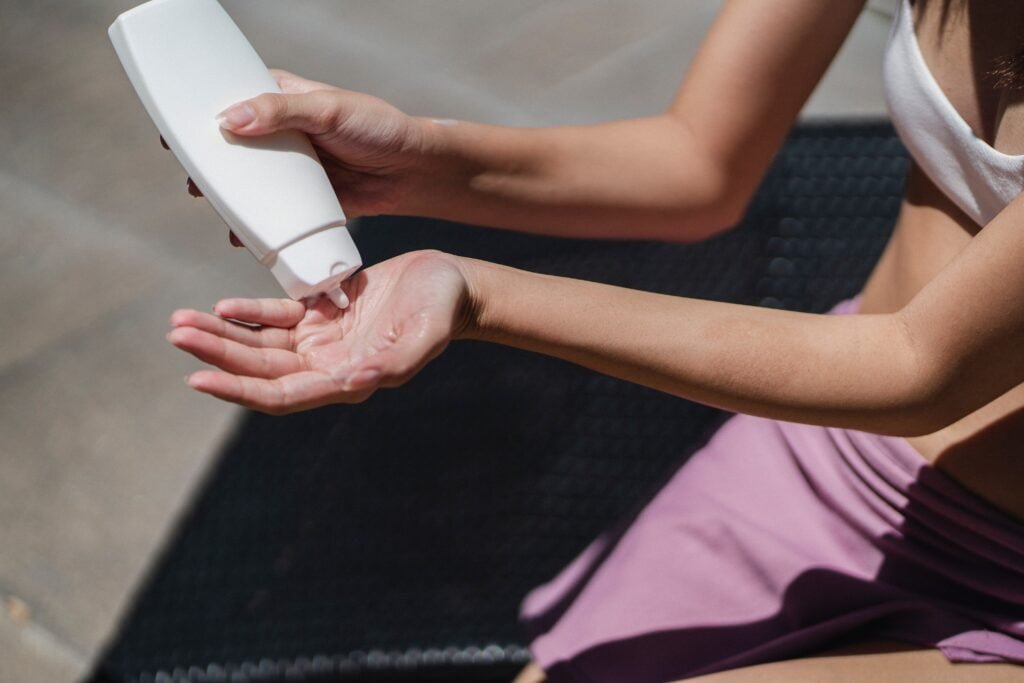What You Need to Know About Vitamin C Sunscreen?
Sun protection is essential for maintaining healthy and youthful-looking skin.
The damaging effects of ultraviolet (UV) rays, primarily from the sun, can lead to premature aging, sunburn, and an increased risk of skin cancer.
That’s why shielding our skin from these harmful rays is of utmost importance.
By combining the powerful antioxidant properties of Vitamin C with the broad-spectrum UV protection of sunscreen, Vitamin C sunscreen offers a comprehensive solution.
It not only shields the skin from UV rays but also addresses common concerns like wrinkles, fine lines, and uneven skin tone.
Get ready to discover the secrets of achieving radiant, youthful skin with the help of Vitamin C sunscreen.
Some of the links in this post are affiliate links. This means if you click on the link and purchase the item, I will receive an affiliate commision at no extra cost to you. All opinions remain my own. Read more on our Privacy Policy page
Understanding UV Rays and Skin Aging

Impact of UV Rays on the Skin
To grasp the significance of UV protection, it’s vital to comprehend how UV rays affect our skin. These rays, classified as UVA and UVB, are forms of electromagnetic radiation emitted by the sun.
- UVA Rays and Long-Term Effects: UVA rays penetrate deeply into the skin, reaching the dermis, which provides structural support. Prolonged exposure to UVA rays can have various long-term effects, such as:
- Premature aging: UVA rays contribute to collagen and elastin breakdown, resulting in wrinkles, fine lines, and sagging skin.
- Hyperpigmentation: UVA rays stimulate melanin production, causing dark spots and an uneven skin tone.
- Increased skin cancer risk: UVA rays are associated with the development of certain skin cancers, including melanoma.
- UVB Rays and the Risk of Sunburn: UVB rays primarily affect the outermost layer of the skin, the epidermis. With their shorter wavelengths, they cause immediate skin damage and sunburn. Key effects of UVB rays include:
- Sunburn: UVB rays induce redness, pain, and skin peeling known as sunburn.
- Skin damage: Prolonged exposure to UVB rays can result in DNA damage, increasing the risk of skin cancer, including non-melanoma types.
Understanding the distinct effects of UVA and UVB rays is crucial for recognizing the importance of UV protection and comprehending how Vitamin C sunscreen acts as a shield, safeguarding our skin against these harmful effects.
Recommended Vitamin C Sunscreen: >>> Murad Essential-C Facial Moisturizer – Environmental Shield Broad Spectrum SPF 30 Gel – Vitamin & Antioxidant Rich Treatment

How to Protect Your Skin from UV Damage and Premature Aging: A Comprehensive Guide
The Power of Vitamin C for Skin Health

Benefits of Vitamin C for Skin
Vitamin C, also known as ascorbic acid, holds remarkable benefits for the skin, making it a key ingredient in effective skincare. Let’s delve into how Vitamin C enhances skin health:
Antioxidant Properties and Free Radical Neutralization:
- Vitamin C possesses potent antioxidant properties, providing protection against harmful free radicals. These free radicals, generated by factors such as UV radiation and pollution, can damage skin cells and accelerate the aging process. By neutralizing these free radicals, Vitamin C helps to minimize oxidative stress and prevent premature aging.
Stimulation of Collagen Production:
- Collagen, a crucial protein, contributes to the skin’s structure, firmness, and elasticity. Vitamin C plays a vital role in collagen synthesis, promoting the production of this essential protein. Increased collagen levels result in firmer, plumper skin, reducing the appearance of fine lines and wrinkles for a smoother complexion.
Brightening and Evening Out Skin Tone:
- Vitamin C has brightening properties that help to even out the skin tone. It inhibits the overproduction of melanin, the pigment responsible for dark spots and hyperpigmentation. By reducing melanin production, Vitamin C aids in fading existing dark spots and promoting a more radiant and uniform complexion.
Role of Vitamin C in Combating UV-Induced Skin Damage and Aging
Vitamin C plays a vital role in shielding the skin against UV-induced damage and combating the signs of aging. Let’s delve into the reasons why Vitamin C is highly relevant in this context:
Protection against Free Radicals Generated by UV Exposure:
- When our skin is exposed to UV radiation, harmful free radicals are generated. These free radicals can wreak havoc on our skin, leading to premature aging, DNA damage, and an increased risk of skin cancer. Vitamin C’s potent antioxidant properties work diligently to neutralize these free radicals, thwarting their harmful effects and preserving the overall health of the skin.
Reduction of Oxidative Stress Caused by UV Rays
- UV rays induce oxidative stress in the skin, resulting in an imbalance between free radicals and the body’s antioxidant defenses. This oxidative stress contributes to collagen degradation, skin inflammation, and the formation of wrinkles and fine lines. By acting as a powerful antioxidant, Vitamin C helps mitigate oxidative stress caused by UV rays, thereby reducing its detrimental impact on the skin.
Promotion of Skin Repair and Rejuvenation
- Vitamin C plays a pivotal role in supporting skin repair and rejuvenation processes. It aids in collagen synthesis, a critical component for maintaining skin elasticity and suppleness. Through its collagen-stimulating properties, Vitamin C facilitates the repair of damaged skin, accelerates the healing process, and reinforces the skin’s natural defense mechanisms, enabling it to better withstand UV-induced damage.
the Benefits of Vitamin C Sunscreen
Advantages of Using Vitamin C Sunscreen
Vitamin C-infused sunscreen offers a multitude of advantages that surpass traditional sun protection. Let’s explore why incorporating Vitamin C into sunscreen is a game-changer:
Enhanced UV Protection through Synergy of Sunscreen and Vitamin C
- By combining the protective properties of sunscreen with the antioxidant prowess of Vitamin C, Vitamin C sunscreen delivers superior UV protection. While sunscreen acts as a physical or chemical barrier against UV rays, Vitamin C reinforces this defense by neutralizing the free radicals generated by UV exposure. This dual-action approach provides amplified UV protection, reducing the risks of sunburn, photoaging, and skin cancer.
Synergistic Effect in Neutralizing Free Radicals
- UV radiation triggers the production of free radicals that can damage skin cells and accelerate aging. Vitamin C, a potent antioxidant, works synergistically with sunscreen to neutralize these free radicals. By doing so, Vitamin C sunscreen reduces oxidative stress, prevents collagen breakdown, and helps maintain a youthful appearance.
Preservation of Youthful Appearance and Prevention of Premature Aging – Vitamin C Sunscreen
- The combined benefits of Vitamin C and sunscreen contribute to preserving a youthful look and preventing premature aging. Vitamin C promotes collagen synthesis, enhancing skin elasticity and diminishing the appearance of wrinkles and fine lines. Moreover, by neutralizing free radicals, Vitamin C sunscreen thwarts oxidative damage, including skin discoloration and uneven texture. This comprehensive approach fosters a radiant, youthful complexion.
How to Heal Sunburn: Natural Remedies and Essential Tips for Quick Recovery
Recommended Vitamin C Sunscreen
Recommended Vitamin C Sunscreen: >>> Murad Essential-C Facial Moisturizer – Environmental Shield Broad Spectrum SPF 30 Gel – Vitamin & Antioxidant Rich Treatment

Why We Recommend Murad Essential-C Facial Moisturizer:
- Broad Spectrum Protection: The Environmental Shield Broad Spectrum SPF 30 protects the skin from both UVA and UVB rays, helping to prevent premature aging and sunburn.
- Vitamin-Rich: Enriched with Vitamin C, this moisturizer not only offers sun protection but also combats free radicals, known to cause skin aging.
- Backed by Science: Murad is a brand known for its scientifically-backed formulations, ensuring that the product has undergone rigorous research and testing.
- Antioxidant Powerhouse: The antioxidant properties of the moisturizer help defend the skin against environmental pollutants and damage.
- Hydration Boost: The gel formula provides adequate hydration without making the skin feel greasy or heavy.
- Brightens Skin: Vitamin C is known for its brightening properties, ensuring a radiant complexion with regular use.
- Combats Signs of Aging: With its combination of sun protection and antioxidants, this moisturizer actively fights signs of aging, promoting a youthful appearance.
Benefits of Murad Essential-C Facial Moisturizer:
- Skin Rejuvenation: The vitamin-rich formula helps revitalize tired and dull-looking skin.
- Daily Protection: The inclusion of SPF 30 means you’re guarded against daily sun exposure, a leading cause of premature skin aging.
- Strengthens Skin Barrier: The moisturizer fortifies the skin’s natural barrier, making it more resilient to external aggressors.
- Improves Skin Texture: With consistent use, expect a smoother, more even skin texture.
- Safe for Sensitive Skin: The formula is gentle enough for those with sensitive skin, providing nourishment without irritation.
- Quick Absorption: The gel consistency ensures that the product gets quickly absorbed, leaving no white cast or residue.
Conclusion:
Murad Essential-C Facial Moisturizer is more than just a sunscreen; it’s a comprehensive skin treatment backed by scientific research. For those seeking a radiant, protected, and youthful complexion, this product offers a potent blend of sun protection and skincare benefits.

Choosing the Right Vitamin C Sunscreen
When it comes to choosing a Vitamin C sunscreen, certain considerations will help you make an informed decision and ensure optimal effectiveness. Here are some key tips:
Look for Stable Forms of Vitamin C
- Opt for Vitamin C sunscreens that feature stable forms of Vitamin C, such as L-ascorbic acid or ascorbyl palmitate. These forms have greater stability, ensuring that the Vitamin C remains potent and effective over time, delivering maximum benefits to your skin.
Consider the Sun Protection Factor (SPF) Rating
- Check the Sun Protection Factor (SPF) rating stated on the sunscreen packaging. The SPF rating indicates the level of protection against UVB rays. To ensure comprehensive protection, select a broad-spectrum sunscreen with an SPF of 30 or higher, providing defense against both UVA and UVB rays.
Evaluate Additional Features
- Assess any additional features that may be relevant to your specific needs. Look for a Vitamin C sunscreen offering broad-spectrum protection to shield your skin from both UVA and UVB rays effectively. If you anticipate exposure to water or sweat, consider a water-resistant formulation to ensure the sunscreen remains effective even during these conditions.
Proper Application and Usage of Vitamin C Sunscreen
To maximize the effectiveness of your Vitamin C sunscreen, follow these essential guidelines for proper application:
- Apply Generously and Evenly to Exposed Areas Dispense an ample amount of Vitamin C sunscreen onto your palm and generously apply it to all exposed areas of your skin. Ensure thorough coverage on your face, neck, arms, and any other exposed body parts. Take care to distribute it evenly for consistent protection.
- Reapply Every Two Hours, or More Frequently During Sweating or Swimming It is crucial to reapply your Vitamin C sunscreen at least every two hours, or more frequently if you are perspiring heavily or engaging in water activities. Even if your sunscreen claims to be water-resistant, regular reapplication is necessary to maintain continuous protection.
The Importance of Incorporating Vitamin C Sunscreen into Daily Skincare
- Incorporating Vitamin C sunscreen into your daily routine ensures consistent protection against harmful UV rays, minimizing the risk of sunburn and premature aging.
- Vitamin C offers additional skincare benefits, such as antioxidant properties that combat free radicals and promote a brighter complexion.
- Daily application of Vitamin C sunscreen helps prevent long-term damage caused by UV exposure, reducing the risk of skin cancer and slowing down the aging process.
- Making Vitamin C sunscreen a part of your skincare regimen ensures comprehensive protection and supports long-term skin health.
- Proper application of Vitamin C sunscreen is essential for keeping your skin shielded, nourished, and radiant.

Conclusion
In summary, Vitamin C sunscreen offers a multitude of benefits in protecting our skin from the harmful effects of UV rays and combating the signs of aging. Let’s recap the key advantages:
Prioritizing UV protection is essential for maintaining healthy and youthful-looking skin. By incorporating Vitamin C-infused sunscreens into your skincare routine, you can elevate your sun protection game and reap the additional benefits that Vitamin C offers.
Make a conscious choice to select a stable form of Vitamin C sunscreen and be diligent in its regular application. By doing so, you can maximize the potential of Vitamin C in safeguarding your skin and combating the signs of aging effectively.
Remember, healthy skin is a reflection of a healthy lifestyle. Prioritize UV protection, embrace the power of Vitamin C, and embark on a journey towards optimal skin health. Let your skin radiate with vitality and beauty for years to come.
FAQs
Does vitamin C protect against UV damage?
While vitamin C offers antioxidant properties and aids in neutralizing free radicals caused by UV exposure, it should not be solely relied upon as a standalone protection against UV damage. Vitamin C complements sunscreen by enhancing its effectiveness in shielding against UV rays. It is essential to use a broad-spectrum sunscreen with a high SPF in conjunction with vitamin C for optimal UV protection.
What is the recommended SPF for anti-aging?
When it comes to anti-aging, experts generally recommend using a broad-spectrum sunscreen with an SPF of 30 or higher. An SPF of 30 provides protection against approximately 97% of UVB rays. However, it is important to note that sunscreen cannot provide 100% protection, so it is crucial to combine sunscreen with other sun-protective measures such as seeking shade, wearing protective clothing, and avoiding peak sun hours.
What is the best vitamin C for sensitive skin?
For individuals with sensitive skin, it is important to choose a gentle and well-formulated vitamin C product. Look for a vitamin C serum or cream specifically designed for sensitive skin, preferably with a lower concentration of vitamin C (around 10% or less) to minimize the risk of irritation. Patch testing the product on a small area of the skin before full application is also recommended to ensure compatibility.
Does vitamin C serum enhance the effectiveness of sunscreen?
Vitamin C serum does not directly enhance the effectiveness of sunscreen in terms of sun protection. However, when used alongside sunscreen, vitamin C can augment overall sun protection. The antioxidant properties of vitamin C help neutralize free radicals generated by UV exposure, reducing oxidative stress and potentially minimizing the harmful effects of UV rays on the skin. This combination provides a more comprehensive approach to UV protection and contributes to overall skin health.






